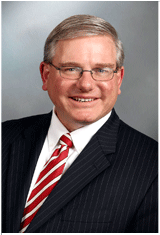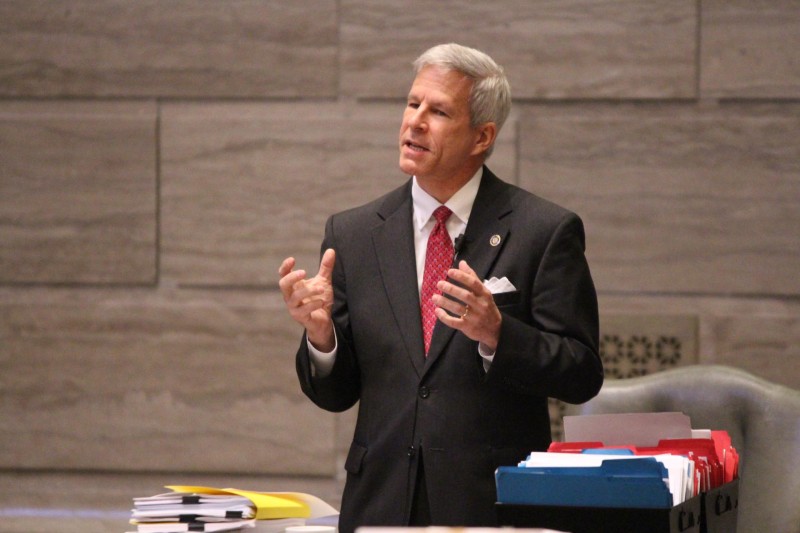JEFFERSON CITY, Mo. – As the end of session draws near, the drive to push bills through in the final hour grows stronger. One of the most contentious issues throughout the current legislative session has been that of civil litigation reform, or as it’s more commonly referred to, tort reform.
Republicans have continuously pushed forward with several legal reform measures this year, particularly items like joinder and venue, arbitration, asbestos litigation, and changing the Missouri Merchandising Practices Act, all under the auspices of creating a more business-friendly environment by deterring what they have labeled as frivolous lawsuits and creating a more fair and efficient legal climate for businesses.
The Missouri Association of Trial Attorneys (MATA) has stood as the staunch opponents against the collaborative efforts of the group of tort reform supporters, working with several lawmakers to hold back the tide as much as possible.
These measures are being spearheaded by Republicans and several influential conservative groups, like the Missouri Chamber of Commerce and Industry or the American Tort Reform Association, arguing that because of the Show-Me State’s legal code, courts are continuously tied up with an influx of lawsuits, costing taxpayer money and employees’ time and that it’s scaring away businesses.

“Because of Missouri’s overly stringent legal code, the courts are continually bogged down with frivolous lawsuits. This wastes state employees’ time and taxpayers’ money. Additionally, businesses take notice,” Sen. Dan Hegeman wrote in a December 14, 2017 opinion piece published by The Clinton County Leader. “When a state is known for having an anti-business climate, potential employers choose to go elsewhere. For businesses already in Missouri, this may dissuade them from expanding. Others might travel to neighboring states more amenable to their concerns.”
The conservatives backing these bills say that these lawsuits are frivolous in nature, to which MATA president David Zevan has continuously replied this session, saying that “all claims are frivolous until they happen to you or your loved one.”
They contend that the reform measures are simply an attempt to protect companies and relieve them of any responsibility for their actions or consequences, an attempt to do the bidding of the business companies without any real regard to the concerns that passing such legislation could diminish and limit Missourians’ abilities to access their own courts.

The most contentious item so far has been the issue of joinder and venue, with SB 546, sponsored by Sen. Brian Munzlinger, taking several turns on the Senate floor as negotiations and conversations take place behind the scenes to see if there might be compromises between both sides.
The idea behind the tactic of joinder is to bring together several similarly-styled cases, in the name of efficiency, but conservative groups take issue with the fact that out-of-state cases can be joined with local cases to receive a more favorable venue, which they call “litigation tourism.”
Under SB 546, plaintiffs would need to separately establish their right to have cases heard in the circuit in which they file. Supporters of the bill say it’s about limiting the issue of “venue shopping,” where trial attorneys file in a court system they feel is more receptive to their kind of case.
St. Louis is reportedly such a system, being given the title of “judicial hellhole” in 2016. Since then, with the passage of several bills during the last session, St. Louis has been downgraded to number three on the list, published by the American Tort Reform Association.
“This is a bill in which we are not trying to stop people from getting a fair trial,” Sen. Brian Munzlinger said. “There’s been an abuse of the venue statute and this will end that abuse. The courts have allowed that to happen, but it is within the power of the legislature to fix it.”
“Why do we want 68 lawsuits instead of one? Because that’s what your bill does,” Sen. Scott Sifton asked Sen. Munzlinger. “Why do we want to annihilate joinder?”
“We are challenging the pillars of democracy and what this country was built on,” Sen. John Rizzo told his senators on the floor during a February debate.
As of this week, the bill has appeared on the floor three times, but the two sides remain at an impasse over two major issues: retroactivity and in-state joinder.
The House version of the joinder and venue bill, Rep. Glen Kolkmeyer’s HB 1578, is also pending in the Senate. The bill seeks to address joinder and venue in a similar manner, with the exception that, unlike Munzlinger’s bill, it was passed out of a Senate committee with an effective date, meaning that it cannot retroactively affect cases as its Senate counterpart would.
City jurors have a reputation for handing out impressive dollar amounts in various cases, including a $38 million award to a Minnesota girl in the case against Abbott’s anti-epileptic drug, or a $110 million award for the claim that Johnson & Johnson’s talcum powder caused ovarian cancer.

“There are some big entities that want joinder to go away. But joinder is a freedom you have that helps you in order to make your case and get justice through our court system,” Sen. Rob Schaaf said. “They want to take that away from you. It’s a freedom issue.”
Schaaf has also been a staunch opponent against any legislation seeking to change the Missouri Merchandising Practices Act (MMPA), which could very well be another noteworthy tort reform item in the minds of leadership.
Senate President Pro Tem Ron Richard sponsored a bill last session seeking to make changes to the MMPA, but its path to passage was blocked due to allegations of pay to play between the Joplin senator and TAMKO owner and Republican megadonor David Humphreys, who resides in Joplin as well. That bill’s current form lies with SB 832, sponsored by Sen. Caleb Rowden.
Filibustering a bill earlier this session, Schaaf read product reviews of TAMKO shingles on the Senate floor, using them as evidence that the MMPA doesn’t need any changes or modifications. TAMKO faces MMPA litigation in the courts.
And while joinder and venue seems to be the most watched of all tort reform bills, the possibility remains that if a deal cannot be reached on either Munzlinger or Kolkmeyer’s bills, then perhaps the Senate leadership will turn to an even more far-reaching tort reform bill: SB 1102, filed by Sen. Mike Kehoe.
The legislation combines several of the top civil justice reform ideas under one bill, including the Missouri Merchandising Practices Act (MMPA), arbitration, interpleader, joinder and venue, punitive damages, and products liability.
It’s a massive omnibus piece of legislation, called the “Frankenstein tort bill” by Schaaf, seeking to address a number of civil litigation reform issues in one single fell swoop.
One concern with Kehoe’s bill, which has so many components under one bill, is that the legislation seems primed to head to the courts for a potential violation of the Missouri Supreme Court’s 1994 decision in the case of Hammerschmidt v. Boone County, which states in simple terms that a bill cannot contain more than one topic.
But as the deadline for session draws near, many have been left to wonder whether the Senate will use the previous question motion to further advance one of these bills.
If either Munzlinger, Rowden, or Kehoe’s bills were to receive the PQ and pass out of the chamber, then it would still need the House approval to reach the Governor’s desk. If the Senate chooses to act on Kolkmeyer’s joinder and venue bill, without any amendments, it could be passed and sent to the Governor’s desk.
But the question here is whether the previous question will be put moved in order to pass such legislation. The PQ does not often appear in the Missouri Senate, though it has become more commonplace in recent times. The first time it was ever used in the Missouri Senate was in 1970.
The use of the PQ has always been somewhat frowned upon, often called the “nuclear option.” Former President Pro Tem Charlie Shields once referred to it as a “traumatic event.”
That’s because the use of the PQ, which only requires a constitutional majority (18 votes in a full chamber), violates the code and tradition of the Senate, which says that any senator should have the ability to delay a vote on any given legislation as long as their stamina allows for. It’s about endurance and patience.
When asked if he would consider using the PQ on a tort reform measure during the current legislative session, Senate President Pro Tem Ron Richard said that he would “absolutely” consider it.
“You know me: whatever is in the worst interest of a trial lawyer, I’m in favor of it,” Richard said. “That’s comical, of course. We have not had any discussion on using the previous question. But I like to kid those guys in the hallway and see if I can get them to the table to negotiate.”
But the other side of the coin is the perception that forcing such legislation through might have.
Schaaf maintains that corporations are pushing for the changes through support for the legislation and through corporate donations.
“These big companies are being sued multiple times, with thousands of cases pending against these companies,” he added.
Debating SB 546 on the floor, Schaaf tried to share a spreadsheet with his fellow senators, a document showing who is behind the bill. Schaaf’s list showed the dollar amounts of campaign donations made by more than a dozen corporations and business owners while noting the number of pending lawsuits under the MMPA each one faced as well.
The total amount of donations? $2,914,516.
This data is publicly available and important in the discussion as we deliberate taking away the rights of citizens to sue. It mentions no senators by name. Why hide it? #moleg pic.twitter.com/nEiN4wiIrK
— Rob Schaaf (@robschaaf) March 12, 2018
When Schaaf tried to distribute that list, he was blocked by Senate leaders.
For Schaaf, at least, the question of whether the PQ will be used on a tort reform measure goes hand-in-hand with the influence of monetary donations.
“This is a case study in wealthy special interests buying favor through campaign contributions to the detriment of the people’s liberty,” Schaaf stated. “The bottom line is this: how much is leadership influenced by all of the campaign contributions that have been made by special interests?”
Benjamin Peters was a reporter for The Missouri Times and Missouri Times Magazine and also produced the #MoLeg Podcast. He joined The Missouri Times in 2016 after working as a sports editor and TV news producer in mid-Missouri. Benjamin is a graduate of Missouri State University in Springfield.










